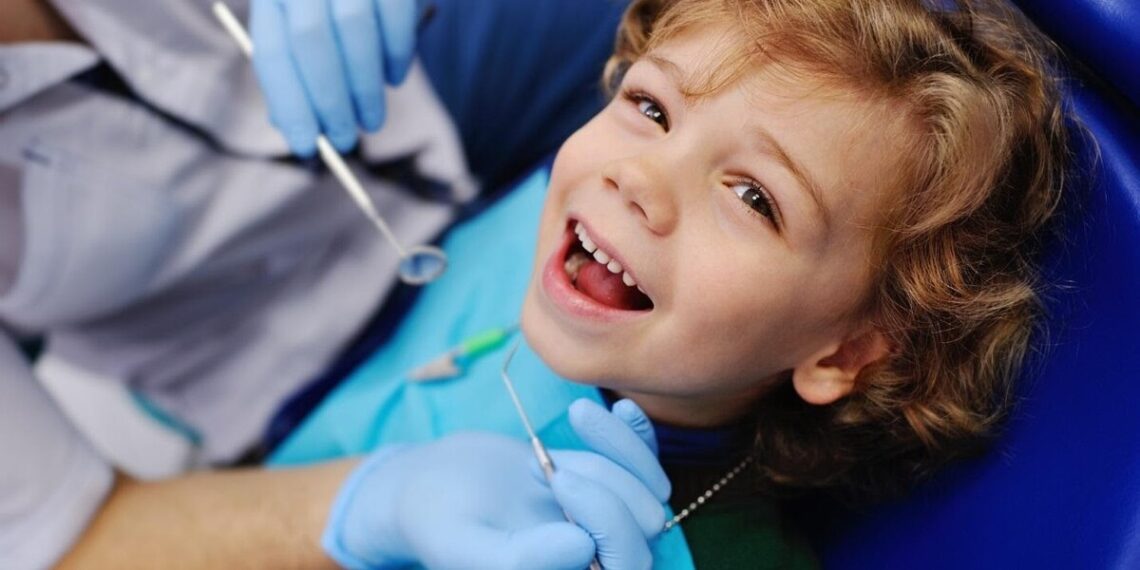Nearly one in four children have untreated tooth decay and cavities.
It’s common for dental issues to start in childhood and last well into adulthood. But healthy dental habits can also begin in childhood, setting the foundation for years of proper dental care.
The oral health practices you teach your children now matter. Here are seven tips to try when teaching your children how to take care of their teeth.
- Start Young
For many parents, it’s frustrating when a child kicks and screams their way through nighttime brushing and flossing. Then, they may be more likely to rush through dental habits or skip them altogether.
To avoid an anti-brushing tantrum, it’s best to start brushing habits young. That way, your children will already be familiar with the activity and more likely to embrace it.
It’s best to begin brushing when a child’s first tooth shows through the gums, which often happens as early as six months old. While you may want to hold off on the toothpaste at this age, you can still use a gentle baby brush to massage your child’s tooth.
As your children continue to grow and develop, teeth brushing will already be a common practice that they’ll be less likely to question.
- Use Songs When Brushing
If your little ones still resist brushing their teeth, try making the experience fun with songs.
To properly clean the teeth and mouth, children (and adults) should brush for around two minutes. But many children grow bored during this time and want to cut their brushing routine short.
To prevent this, play a designated teeth brushing song that is around two minutes in length. Make it a song that your children enjoy—there’s no rule against dancing while brushing! That way, they’ll brush for the right amount of time, while enjoying every second.
- Try Educational Books and Videos
Many children may see brushing and flossing as just another chore they must do every day. But storybooks and educational videos can help them understand why they brush, while normalizing it as a habit everyone does.
Seeing a book character or a cartoon brushing their teeth can help motivate your children to brush theirs too. And if they start to recognize the risks of cavities and other oral health issues, even if only in an age-appropriate way (such as imagining cavities to be little monsters that attack teeth), they may better understand the reason behind brushing and flossing regularly.
- Find an Inspiring Dentist
Going to the dentist doesn’t have to be a dreadful, scary experience. The right dentist should make your children feel comfortable and motivated to care for their teeth.
When looking for the kids best dentist, look for one who has a friendly and exciting approach to dental care. They should be experienced with children and know how to communicate at their level.
Then, going to the dentist can start to feel like an adventure for your children, and they’ll look forward to every dentist visit.
- Give Your Children a Choice
When children have some say in their dental habits, they’re more likely to be engaged and excited to do them.
And no, that doesn’t mean giving them a choice of whether or not to brush and floss. Instead, it means giving them a choice about what type of toothbrush to use, what color dental floss to try, and what toothpaste to buy.
You can also allow them to choose their own teeth brushing song or even choose how they brush their teeth. For example, some children may prefer to bring a stool to the sink while brushing so they can sit and relax.
Customize the experience as much as possible to keep it fun and appealing for your children.
- Model Healthy Dental Habits
Teaching your children how to care for their teeth starts with caring for your teeth.
Model the kind of behavior you want your children to have. If you want them to brush for two minutes, be sure to brush your teeth for just as long. And if you want them to floss regularly, floss in front of your children so they can see that you do it too.
And the more excited you are to care for your own mouth, the more likely they will be.
You may even want to try practicing dental habits with your kids at the same time. That way, it becomes a shared family activity.
- Reward Proper Dental Care
If your children are still struggling to feel motivated to care for their oral health, offer some positive rewards to encourage them.
You could try a gold star system, where a child receives a star each time they brush or floss their teeth. Then after a certain amount of stars, they get a fun prize.
You can also explain to your child that the sooner they brush their teeth, the sooner they can read a bedtime story, for example.
Finding ways to reward proper dental care can reinforce to your children that brushing and flossing are not only essential, but also a fun part of their daily routine.
Teach Your Children Dental Habits, Without a Tantrum
If your children resist dental care habits such as teeth brushing and flossing, it can make your daily routine extra stressful.
Try these seven tips to make dental habits fun while motivating your children to care for their teeth—without the fights and tantrums. If any of your children encounters any dental problems, be sure to check out this pediatric dentist in Fredericksburg, VA who can take proper care of their teeth.
To continue reading about children’s health and dental care, visit our other health articles for more advice!

